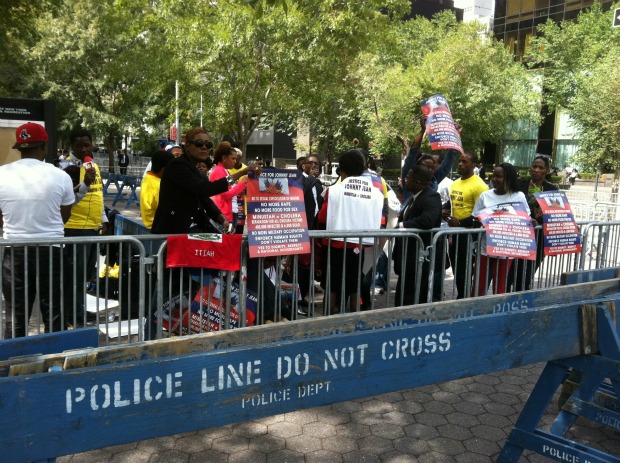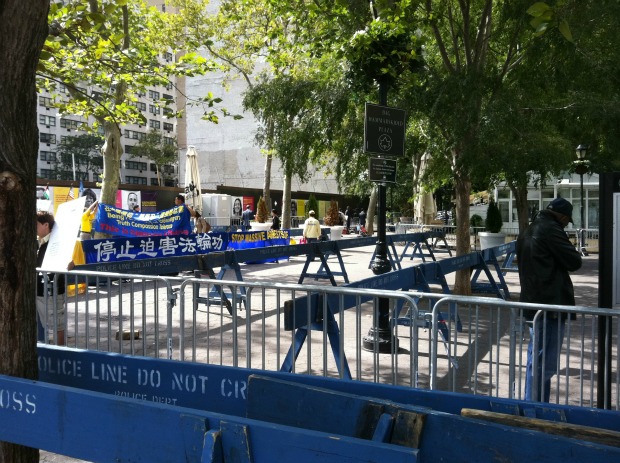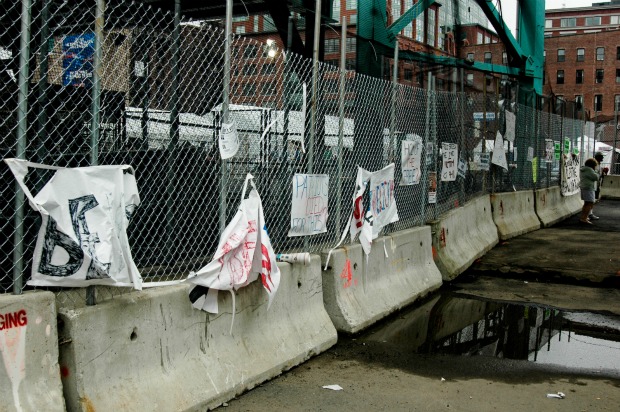Every year in September, New York turns into utter chaos. On the Upper West Side, one can blame the pre-Chagim (High Holy Days) rush to get everything done, with Jewish Americans raiding kosher markets and stocking-up for their big meals and for their expected guests. But across Central Park and slightly more downtown, the madness – arguably of a more intense frenzy – can be rightfully blamed on an entirely different group of people. Thanks to a gathering of the world’s 180+ leaders and their massive entourages, security is tightened, roads are closed and traffic is diverted. This, in a city already notorious for cabs barely inching (or “centimetering” for +972mag readers outside of the US) their way forward during good times.
But walking through some of the madness a few days ago to receive my media credentials at the United Nations General Assembly press tent, I passed the cordoned-off area dedicated for protestors. I was insistently reminded of Boston and New York circa 2004, when U.S. Democrats and then, one month later, Republicans held their presidential conventions. These were the first major national events post-9/11, and both cities were on high security alert. Being the “freedom loving Americans” that they were, organizers decided that protesters attending either convention should express their First Amendment rights at a respectable distance and inside a cage, obnoxiously dubbed the “Free Speech Zone.”
On this particular New York day, there were no fences or cages per se. But the memory I had of seeing in 2004 such constraints placed on a cherished American virtue was triggered seven years later by the police barricades neatly and methodically arranged on the corner of East 46th and First Avenue, barricades I imagine are intended to ensure that those wishing to demonstrate do not dare get carried away. When stopping to think about it, I found it ironic that these are the people one apparently need be worried about, particularly given that those behind the barricades probably pose less threat to global security and safety than those officially gathering across the street.

The corner itself was a rather large, (usually) open area, a rarity for Manhattan. But the barricades chopped it up into several long narrow subsections, meant to both contain the demonstrators to small spots but also to prevent counter-demonstrators from confronting each other. Imagine the scene, if you will, going something like this: “Okay, let’s see. ‘Save the Dolphins,’ take Protest area 1D. ‘Free Palestine’ … you are in Protest area 2C. Got that? 2C! Hey, you with the blue and white Star of David flag … I told you, you are all the way on the other side.” Poor police. And I am sure they got really confused when the anti-Zionist ultra-Orthodox Neturei Karta guys eventually showed-up. “Hey lieutenant, I’m not sure where to send these guys. They have long beards and black hats, but the folks with the Israeli flags don’t want them.”
So it wasn’t quite like this, but you get the point. It was admittedly at the start of the weeklong assembly when I passed-by, and at the time only two small groups were there. One was calling for the “liberation” of Haiti. Another was a group of Falun Gong engaged in synchronized meditation. Quick, put up the cages.

About thirty minutes later, I was next-in-line to receive my media credentials. But the two journalists in front of me who were being served were holding-up everything. Apparently, UN media officials denied their request for press passes. The two journalists write for a publication called “The Epoch Times,” which, published in several languages and distributed free-of-charge around the world, is unabashedly critical of China’s Communist Party. As the press officer explained to the pair, they work, she said, as a PR division of an association. In this case, she is referring to the publications alleged ties to the Falun Gong, something it denies. She politely told them she supports their right to publish whatever they want, but they are being denied access because the international body does not recognize the paper in which they publish it.
In the UN’s defense, the two writers should have seen this coming. They have been doomed ever since 2006 when a colleague of theirs, Wang Wenyi, used her White House press pass to gain access to a media briefing involving the Chinese President Hu Jintao, only to then verbally ambush him during his speech. (She accosted Hu’s predecessor Jiang Zemin five years earlier in Malta.) But it still raises the question of why some tactics are valid while others aren’t, and who authorizes the “validator” to do so on the public’s behalf. While working at a previous news organization, on at least a few occasions, I and other journalists working there found some approaches questionable if not unethical. Yet the organization – privately funded and having no public oversight or transparency of its budget – has established its place at the table of “official media.” I am not saying that it should not be there, but rather I am asking: who gets to decide? In theory, it should be about Freedom of Speech. Right?
In his 1941 State of the Union address, U.S. President Franklin D. Roosevelt spoke of four freedoms that he – and later the Allied Forces – cherished as rights that everyone in the world ought to enjoy: freedom of speech, freedom of worship (which morphed into “freedom of assembly”), freedom from fear and freedom from want. Those principles, in 1948, became the foundation of the Declaration of Human Rights as adopted by the United Nations. In the interest of breaking Israelis from the third one, Prime Minister Binyamin Netanyahu should be respected as he takes to the podium at the UN General Assembly on Friday. But in the interest of breaking Palestinians from the fourth one, he should show up an hour early and listen to President Mahmoud Abbas speaking before him.
This is not an ideal world. A “free people” protest from inside cages, and a “free media” are selected by international bouncers. And so it seems both men are there instead to talk, not necessarily to listen. And who among the other nations can criticize them?

